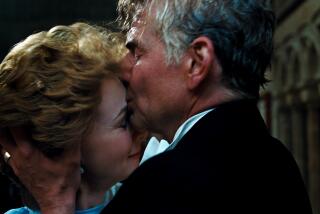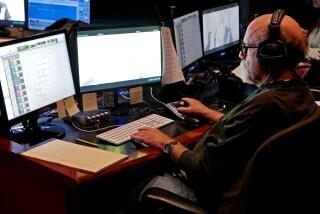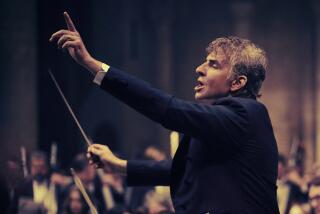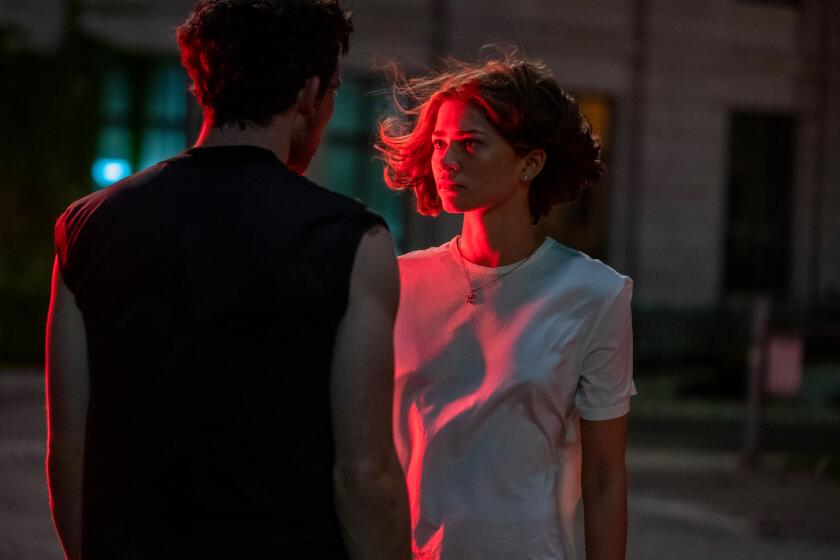John Williams and Steven Spielberg mark 40 years of collaboration
The quietest room in Hollywood may be the office where John Williams composes. In a bungalow on the Universal Studios lot, steps from the production company of his most frequent collaborator, director Steven Spielberg, Williams works alone at a 90-year-old Steinway grand piano, with fistfuls of pencils and stacks of composition paper nearby, and worn books of poetry by Robert Frost and William Wordsworth piled on the coffee table.
“My relationship with Steven is the result of a lot of very compatible dissimilarities,” Williams said in a late December interview during a week that saw the U.S. releases of both of the duo’s latest joint efforts, the comic-book adaptation “The Adventures of Tintin” and the World War I epic “War Horse.” “Steven works with huge groups of people and is an international businessman.... This is the environment that I need. I don’t use a lot of — as my younger colleagues do — synthesizers and computers. When I started, that didn’t exist.... It is a labor-intensive, solitary business.”
Williams, who turns 80 Feb. 8, has penned the scores to 25 of the 26 feature films Spielberg has directed, a musically polyglot list that includes “Jaws,” “Close Encounters of the Third Kind,” “E.T.,” “Raiders of the Lost Ark,” “Schindler’s List” and “Saving Private Ryan.” (Producer Quincy Jones wrote Spielberg’s “The Color Purple” score.) The remarkably enduring partnership — between men who straddle two generations of Hollywood filmmaking and who met over a blind lunch date in 1972 — has yielded 13 Oscar nominations for original score, and some of the most widely recognized music in cinema.
At the time of this interview, Williams was polishing a quartet for the Boston Symphony Orchestra, which will celebrate his birthday this year with performances of his music by artists including cellist Yo-Yo Ma and opera singer Jessye Norman; he had just finished updating themes for the “Today” show and “Meet the Press”; in a few months, he’ll begin composing for Spielberg’s next film, “Lincoln.”
Unlike the giants of Hollywood movie music who preceded him — composers like Bernard Herrmann and Dimitri Tiomkin who are identified with a distinctive sound — Williams has no discernible tells as a songwriter, beyond an emphasis on accessible melodies. That stylistic versatility has been the foundation of their partnership, according to Spielberg.
“John is much more of a chameleon as a composer,” Spielberg said by phone from the Virginia set of “Lincoln.” “He reinvents himself with every picture. The score to ‘Tintin’ could not be more dissimilar to his score to ‘War Horse.’ They fit the characterizations of the different movies. The ‘Tintin’ music is a rollicking adventure, an exhilarating ride downhill. He’s chasing the audience with his score. In ‘War Horse,’ he wrote music for the land … the period, evocative of the early 20th century.”
Born in New York, the son of a jazz percussionist, Williams moved to Los Angeles in 1948 when his father began playing in the Columbia Pictures orchestra. As a child, he took up the piano. “The only adults I knew were musicians, his friends, so I thought that’s what you did when you grew up,” he said. “It seemed to be an inevitable life path for me.”
He would go on to attend UCLA and the Juilliard School, and work as a studio pianist on scores by Jerry Goldsmith and Henry Mancini — it is Williams, credited as “Johnny Williams,” playing the indelible jazz riff on Mancini’s 1958 “Peter Gunn Theme.”
By the time Spielberg and Williams met in 1972, the composer had nearly 20 years of film and TV scoring behind him; he had collected an Oscar for adapting “Fiddler on the Roof” to the screen and had just scored a giant commercial hit, “The Poseidon Adventure.” Spielberg was a 25-year-old television director about to shoot his first theatrical feature. The young filmmaker had listened to a record of an Americana-style score Williams composed for “The Reivers” so many times that he had worn it out, and he wanted a similar sound for his feature debut, “The Sugarland Express.” At Spielberg’s request, a Universal executive arranged a meeting.
“Steven took me to a very fancy restaurant in Beverly Hills for lunch, in the days of these martini lunches,” said Williams. “It was like going with a teenager who had never ordered wine before and didn’t quite know what to do with the silver. He was so young, a little older than my children but not a whole lot. And seemed to know more about my music than I did. He would sing third themes from some remote western.”
Impressed by the script and charmed by the boyish enthusiasm of its director, Williams agreed to work on the movie, and arguably the most successful film music partnership in Hollywood history was born.
“If you look at theirs in the larger context of director-composer relationships, you can look at Herrmann and Hitchcock, Fellini and Rota, Prokofiev and Eisenstein,” said film music historian Jon Burlingame, author of “Sound and Vision: 60 Years of Motion Picture Soundtracks.” “This collaboration really outpaces them all in terms of the number of films and the diversity of material.”
It was the score to Spielberg’s second film, “Jaws,” that cemented the partnership. Spielberg had used Williams’ atonal music from the Robert Altman movie “Images” as a temporary soundtrack while editing “Jaws,” and he expected Williams to deliver similarly cerebral music for his shark movie. The composer, however, had other ideas.
“I fiddled around with the idea of creating something that was very … brainless,” Williams said. “Like the shark. All instinct.... Meaning something could be very repetitious, very visceral, and grab you in your gut, not in your brain. Remember, Steven didn’t have the computer shark. He only had his rubber ducky, so the simple idea of that bass ostinato, just repeating those two notes and introduce a third note when you don’t expect it and so on. It could be something you could play very softly, which would indicate that the shark is far away when all you see is water. Brainless music that gets louder and gets closer to you, something is gonna swallow you up.”
“When Johnny played me the ‘Jaws’ score on the piano, I thought he was pulling my leg,” Spielberg said. “And he played it again. And then he played it until I stopped laughing. I had a more esoteric idea musically in mind. He said, ‘The sophisticated approach you would like me to take isn’t the approach you took with the film I just experienced. This is a huge, over-the-top pirate movie.’”
Spielberg deferred to Williams; the score won Williams his second Oscar; and 37 years later, that two-note theme is still a musical shorthand for mortal danger.
Williams said he rarely sees any film he’s working on until it is nearly finished, preferring to wait until a movie’s rhythm has been well-established in the editing room.
“I need to know how it breathes and where I can help to accelerate it or retard it or create an expectancy or defuse one,” he said. “We discuss where to put the music and what its function will be in the scenes. I’ll play Steven a few little half-developed themes on the piano. In the 40 years we’ve been working together, he’s never said to me, ‘I don’t like that’ or ‘That’s not good.’ He offers just by his body language and his eyes and his face a sense of encouragement in this direction or that direction.”
The first time Williams ever hesitated upon screening a Spielberg film was in 1993, after seeing a cut of the Holocaust epic “Schindler’s List.” Williams recalled telling the director: “Steven, you need a better composer for this.”
“I couldn’t believe he said that to me,” Spielberg said. “I turned to him and said, ‘You’re right. But they’re all dead.’”
Over the decades Williams has worked with other high-profile directors including George Lucas, Richard Donner and Oliver Stone, and has maintained an ongoing relationship with NBC (it’s not your imagination — the theme to “Sunday Night Football” really does sound like a Darth Vader cue). He has been nominated for 45 Oscars, more than any other living person, and won five; if he receives a nomination for either of his newest Spielberg scores, he will be second only to Walt Disney, who had 59 academy nods.
As electronic-music- and pop-song-driven soundtracks have become increasingly popular, both for financial and aesthetic reasons, Williams’ manner of working, with the help of his music editor, Ramiro Belgardt, and live, often 100-plus-piece orchestras, has become increasingly rare. It’s a throwback style simpatico with Spielberg’s preferences, which were forged in the era of orchestral-driven studio epics like “Spartacus” and “Lawrence of Arabia.”
“I don’t like electronic scores, so Johnny and I have been very Luddite about including full orchestras and full choirs in most of our films,” Spielberg said. “We don’t like to use electronics to make music. I can always tell the difference between an orchestra and a synthetic orchestra... I love orchestras. I never leave the scoring sessions. It’s my vacation from the movie I just made.”
Some critics have called the “War Horse” score sentimental — a reflection, perhaps, of the tastes of an earlier era. Williams said he takes the long view of his own scores. “I think ‘E.T.’ is an example of a film that’s as good now as it was when we did it,” Williams said. “Cars look different, people don’t dress the same way, but it seems right musically to me still. We need to look at ‘War Horse’ 30 years hence and decide then how we feel about it.”
During a recent American Film Institute “Master Class” that aired on Turner Classic Movies, Spielberg was nearly as deferential to Williams as he had been at lunch 40 years ago. He described himself as directing scenes specifically “for Johnny,” such as the rambunctious chase sequences in “Raiders of the Lost Ark.” “The entire last 25 to 30 minutes of ‘Close Encounters’ I opened the shots up so John would be able to create a more operatic sound,” he said.
With his white beard and avuncular manner, Williams is the undisputed elder statesman of Hollywood composers. He said he used to write for 10 hours a day six days a week, and now writes for closer to five or six hours, leaving time to walk each day for an hour at the Bel-Air Country Club near his home. He listens to Haydn and Mozart for pleasure, but more often prefers the sound of silence.
He said he has begun consulting with a musicologist about “Lincoln,” which just wrapped production, and plans to rely on the Chicago Symphony Orchestra for the score, to evoke the sounds of the 16th president’s home state of Illinois.
“[Spielberg is] a much younger man than I am and he will go on a lot longer than I’ll be able to, but for the time being we’re having a wonderful time. Time goes by so quickly,” Williams said. “Steven and I, when we’re working together we’re so much in the now, in this moment. There isn’t a past, there isn’t a future, you’re so completely absorbed and concentrated. If you do that long enough, you suddenly realize, my God, I’m 80 years old, what happened? What happened was a well-spent, focused period of time.”
More to Read
The biggest entertainment stories
Get our big stories about Hollywood, film, television, music, arts, culture and more right in your inbox as soon as they publish.
You may occasionally receive promotional content from the Los Angeles Times.







